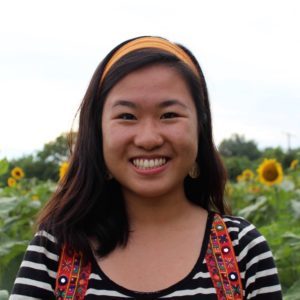 LearnServe alumna Amy Wu is gamifying and democratizing the autism therapy experience through engaging simulations of social situations. Her venture Social Cipher engages an interdisciplinary team across psychology, neuroscience, and computer science, using game design and virtual reality to help kids on the Autism Spectrum build a toolkit for interpersonal success. The goal is to give kids a fun and safe environment where they can replay social scenarios until they overcome their insecurities and understand interactions in their own way. Social Cipher imagines a future in which a diagnosis isn’t a deficit, but a cipher-solving super power that may just change the world.
LearnServe alumna Amy Wu is gamifying and democratizing the autism therapy experience through engaging simulations of social situations. Her venture Social Cipher engages an interdisciplinary team across psychology, neuroscience, and computer science, using game design and virtual reality to help kids on the Autism Spectrum build a toolkit for interpersonal success. The goal is to give kids a fun and safe environment where they can replay social scenarios until they overcome their insecurities and understand interactions in their own way. Social Cipher imagines a future in which a diagnosis isn’t a deficit, but a cipher-solving super power that may just change the world.
Social Cipher started with 7-year-old girl named Ava who loves Super Mario Bros. They decided to build a Mario-like game for Ava that might help her navigate social situations, then realized that it could help plenty of other kids like her as well. Currently, the team is building a prototype in Unity, and they’ve been using a human-centered design process to interview parents and test storyboards with Autistic children, focusing on pinpointing users’ needs and finding the gaps. The team’s work is backed by clinical virtual reality research and Autism studies, and in collaboration with a clinical psychologist at USC’s Institute of Creative Technologies and a narrative game designer at Riot Games. The venture started with an idea in spring 2017 through Claremont McKenna College’s social innovator incubator. Social Cipher was a finalist in National Geographic’s Chasing Genius competition in March 2018, and they are currently on track to have a working prototype by summer 2018.
We interviewed Amy about her experiences with LearnServe and journey launching Social Cipher.
How did your experiences with LearnServe change aspects of how you interact with the world?
LearnServe taught me to be a doer and a starter. Growing up, I think I was always kind of terrified of doing anything other than what I was expected to do, and there was definitely a sense of complacency. Being surrounded by peers who wanted to be movers and shakers ignited a curiosity and an itch to understand more of the world that I didn’t even know I had. I knew I wanted to explore entrepreneurship and social impact more in college, so I interned at Empowered Women International (another awesome D.C. nonprofit that offers entrepreneurship training to refugee and low-income women), a women’s water and sanitation nonprofit in Kenya, and a tech startup in Boulder, Colorado. I’m going all in with my passion for entrepreneurship now with Social Cipher, and I also just found out that I’ll be spending the next year on a Fulbright grant doing economic research on entrepreneurship in Hungary!
What inspired you to launch Social Cipher?
Vanessa, one of my best friends at Claremont McKenna College, was diagnosed with Asperger’s as a kid. Her mother was single mom and despite having a million other responsibilities to keep the whole household afloat, she spent a ton of time helping Vanessa train and practice her social skills. We were throwing around ideas for making therapy more accessible through simulating social interactions through repetitive training when we realized we could make that happen through games. I went right back to the mindset of feeling like I could do something about an issue that LearnServe had taught me! Vanessa has a background in neuroscience research, and I had just spent the summer interning at a startup. We had friends who were psych majors working at Claremont McKenna’s Autism Center, and also a friend who was an amateur game developer. We could gamify and digitalize (parts of) the Autism therapy experience.
How has participating in the National Geographic Chasing Genius competition influenced Social Cipher?
It really reaffirmed the need for such a product — the positive feedback we got was overwhelming and honestly so motivating. It also forced us to think about how we want to communicate about our project because it was the first time we talked about Social Cipher on public platforms — we had been operating in a sort of “stealth mode” because we were still building the prototype and didn’t want to inflate expectations without a concrete product to back them up. But then we realized that the feedback and support were super important — the Autism community is not only who we’re building our game for, but they also have a such a vested interest in our success and the leverage to help make that success possible. If we want to grow our scrappy prototype into an actual product, we need the backing to turn our idea into reality!
What are a few key points you would like young change makers to understand about social entrepreneurship?
Finding your cause is a journey in and of itself. I think it’s totally okay to not know right now, and your cause may change over time. You may have multiple causes you care about, and that’s okay, too. As someone who doesn’t have a deeply personal connection to Autism, I wouldn’t have imagined Autism being “my cause” in high school, but now I do have the experiences and skillset to help a close friend with a compelling story. Being a partner in crime is awesome, too!
